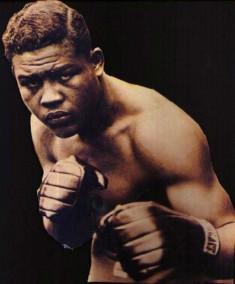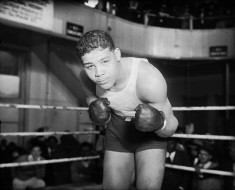| Joe Louis | |
|---|---|
 |
|
| Boxer | |
| Born | May 13, 1914 Lafayette, Alabama |
| Died | Apr. 12, 1981 (at age 66) Paradise, Nevada |
| Nationality | American |
Joe Louis, also known as the Brown Bomber, was a very popular American professional boxer. He was the world heavyweight champion for about 140 months from 1937 to 1949. Today, he is considered one of the best heavyweight champions in the history of boxing.
Joe helped elevate boxing from minor popularity to a more popular sport by creating a reputation of an honest and hardworking fighter at a time when the sport was dominated by gambling. During his time as champion, he defended the title 26 times.
Early Life
Joe Louis was born on May 13, 1914, in a house located just a short distance from Alabama State Route 50. His parents were Munroe and Lillie Barrow, and he was the seventh out of eight children.
Joe’s parents were former slaves who alternated between rental farming and sharecropping. For the first 12 years, Joe spent his childhood in rural Alabama. In 1916, his father was sent to a mental institution. When growing up, Joe Louis knew very little about his real dad. In 1920, his mother married Pat Brooks, a local contractor.
In 1926, Joe’s family moved to Detroit, Michigan after they had a scary encounter with the Ku Klux Klan in Alabama. The family settled at 2700 Catherine Street and Joe attended a vocational school to learn about the cabinetmaking trade.
Louis’s Early Career
In 1932, at the age of 17 years old, Joe made his own amateur debut. He won several victories and in 1933, he won the Detroit-area Golden Gloves Championship against his rival, Joe Biskey. After one year, he won the light heavyweight classification and the Chicago Tournament of Champions.
In April of 1934, Louis won the US Amateur Champion AAU tournament. His record was an impressive 50 wins and four losses with several knockouts by the end of his early career.
Professional Career
Joe Louis had a record of 72 professional fights with three losses. He tallied 57 knockouts with three defeats and held the championship between 1937 and 1949. This was longest time span of any known heavyweight titleholder.
Obtaining Management
During this time, pro boxing was not officially segregated. However, many white people were wary of the idea of another famous black champion in the wake of Jack Johnson’s very unpopular reign. In May of 1935, Louis turned 21. He was signed by both Roxborough and Black to an enormous long-term contract that dedicated half of his future personal income to the two. In 1935, he fought 13 times.
World Championship
 In 1936, Joe fought against Max Schmeling, the former world heavyweight champion. Max handed Joe his very first loss as a professional fighter by a knockout in round 12. After this loss, in June of 1937, James Bradock, the “Cinderella Man,” knocked Joe down in the first round.
In 1936, Joe fought against Max Schmeling, the former world heavyweight champion. Max handed Joe his very first loss as a professional fighter by a knockout in round 12. After this loss, in June of 1937, James Bradock, the “Cinderella Man,” knocked Joe down in the first round.
After constant punishment, Joe Louis beat the “Cinderella Man” by knocking him out in round 8. Joe’s ascent to the world heavyweight championship was complete. This was a very important victory in the African-American culture as thousands stayed all night to celebrate.
World War II
Joe Louis continued to fight in a variety fights. In 1942, he fought one charity bout for the Navy Relief Society. This generated about $47,000 for the charity. Two months later, he fought in one more military charity bout. Joe traveled a lot for his charity events. Apart from these travels, he was also a great focus of the media recruitment campaign that encouraged African-American people to enlist in the armed services despite the military’s racial segregation.
Personal Life
Joe Louis had two children with his wife, Marva Trotter. He also adopted three other kids. He divorced his wife in 1945 and remarried after one year. In 1955, he married his third wife and in 1959, he married his fourth wife.
Louis died after suffering from cardiac arrest in Las Vegas on April 12, 1981.
Recognition and Legacy
In 2005, the International Boxing Research Organization ranked Joe Louis as the #1 heavyweight champion of all time. He was also ranked #1 on The Ring’s list of 100 Greatest Punchers of All Time, too.
Outside the ring, Joe’s impact was also felt. He was regarded as the very first African-American to achieve such a prominent status within the U.S. He was a focal point of the anti-Nazi sentiment during the Second World War and he was also instrumental in integrating the game of golf. This helped break the sports color barrier in America when he appeared under a sponsor’s exemption in the PGA in 1952.